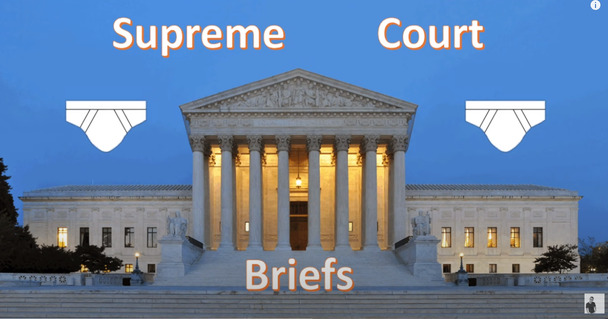
Speaker 1: Mr. Beat presents Supreme Court briefs, Washington DC 2002, Robert, a levy of the Libertarian think tank. The Cato Institute seeks to challenge a DC law that made it illegal to possess handguns, automatic guns, or high capacity semi-automatic guns. In fact, the law, which has been in effect since 1976, said DC residents couldn't even keep them in their own homes. Levy tries to find DC residents to sue the city based on his argument that the gun ban went against the second amendment of the Constitution. Levy would fund the whole thing. He found six residents with various backgrounds who agreed to sue. Among them, Shelly Parker, a software designer who wanted a gun to defend herself against violent drug dealers in her neighborhood. Levy chose her to be the leading plaintiff. Also, among the plaintiffs was a dude named Dick Heller. Heller was a licensed police officer who got to carry a gun for his security job guarding federal buildings.
Speaker 1: Yet it was illegal for him to have a gun in his own home. Heller was passionately against the gun ban and spent years fighting it. Even previously going to the National Rifle Association or NRA in an attempt to sue the city. The NRA had declined in district court. Levy, and his plaintiffs had no success. In fact, district Court Judge Ricardo Urbana dismissed the lawsuit. However, the court of appeals for the DC Circuit reversed that dismissal saying DC's gun ban was unconstitutional. The court argued that the Second Amendment protects an individual right to keep and bear arms. They also argued that right existed before the Constitution existed, and that the idea of owning a gun was that it could be used for things like hunting and self-defense. Not only self-defense from intruders to the home, but even tyrannical governments. Whoa, man, bold statements there. Oh, yeah.
Speaker 1: They also said the only plaintiff who could claim damage though was Dick Heller, who apparently was the only one who applied for a handgun permit, but was rejected. The District of Columbia appealed to the Supreme Court, and Heller was like, yeah, please do. You see, the Supreme Court had kept pretty silent on the Second Amendment throughout American history. In fact, it hadn't even considered the true meaning of the Second Amendment for about 70 years. So when it agreed to hear the case on November 20th, 2007, it was certainly historic, which is why I guess I'm making a video about this case. I mean, duh, Mr. Beat. Anyway, the court heard oral arguments on March 18th, 2008. The big question was, did the DC law restricting access to guns kept in the home, go against the Second Amendment? The court said yes. On June 26th, 2008, it announced it had sided with Heller, it was five to four.
Speaker 1: The court argued the Second Amendment wasn't just about having a well-regulated militia, and that the term militia wasn't just those serving in the military. They said the Second Amendment was also about individuals having the right to have weapons to defend themselves. So this part was independent from this part. So banning guns commonly used for protection like DC did, violated the Second Amendment. However, the court added that the Second Amendment is not unlimited. Not everyone should be able to get a weapon. It wasn't a right to have a weapon whenever or for whatever purpose, and the type of weapon mattered extremely dangerous. Weapons not commonly used for hunting or self-defense could be banned. Really, most of the arguments revolved around the self-defense argument for the dissent. Justice John Paul Stevens argued that the Second Amendment doesn't protect an unlimited right to have guns for self-defense purposes, and that it was really about the right for Americans to have weapons for military purposes.
Speaker 1: The dissent seemed to read the Second Amendment more as a whole. Critics accused Antonin Scalia, who wrote the opinion of the decision and the rest of the majority of judicial activism, meaning their ruling was based on their personal opinions, not an objective interpretation of the law. Regardless, DCV Heller is the Supreme Court decision that made it clear that the Second Amendment was about an individual's right to own guns. It was a rare time when the court explicitly said what the Second Amendment means, although they still left some gray area, and the gun control debate is far from settled with the unfortunate regular occurrence of mass shootings in the United States. This decision remains very controversial. However, those who want to further limit guns in the United States likely will have more success passing new laws or even amendments to the Constitution, not new lawsuits.
Speaker 1: I will see you for the next Supreme Court case jury. I've been waiting to make an episode about that case for a very long time, but I feel the time is right now due to the recent shift in the national dialogue about gun control. Do you agree with the court, with the DCV Heller decision? Do you think that gun laws in the United States should change? If so, how should they change? Let me know down below, and I will be releasing my video next week on Saturday instead of the usual Friday for two reasons. One, I will be headed to so by Southwest EDU. The second reason is because it will be a collaboration video with Canis Productions. Thank you for watching. We'll see you next week.
Credit: Mr. Beat
Also, read Armed Citizens' Legal Defense Network (ACLDN) Policy Review By Marc Victor
